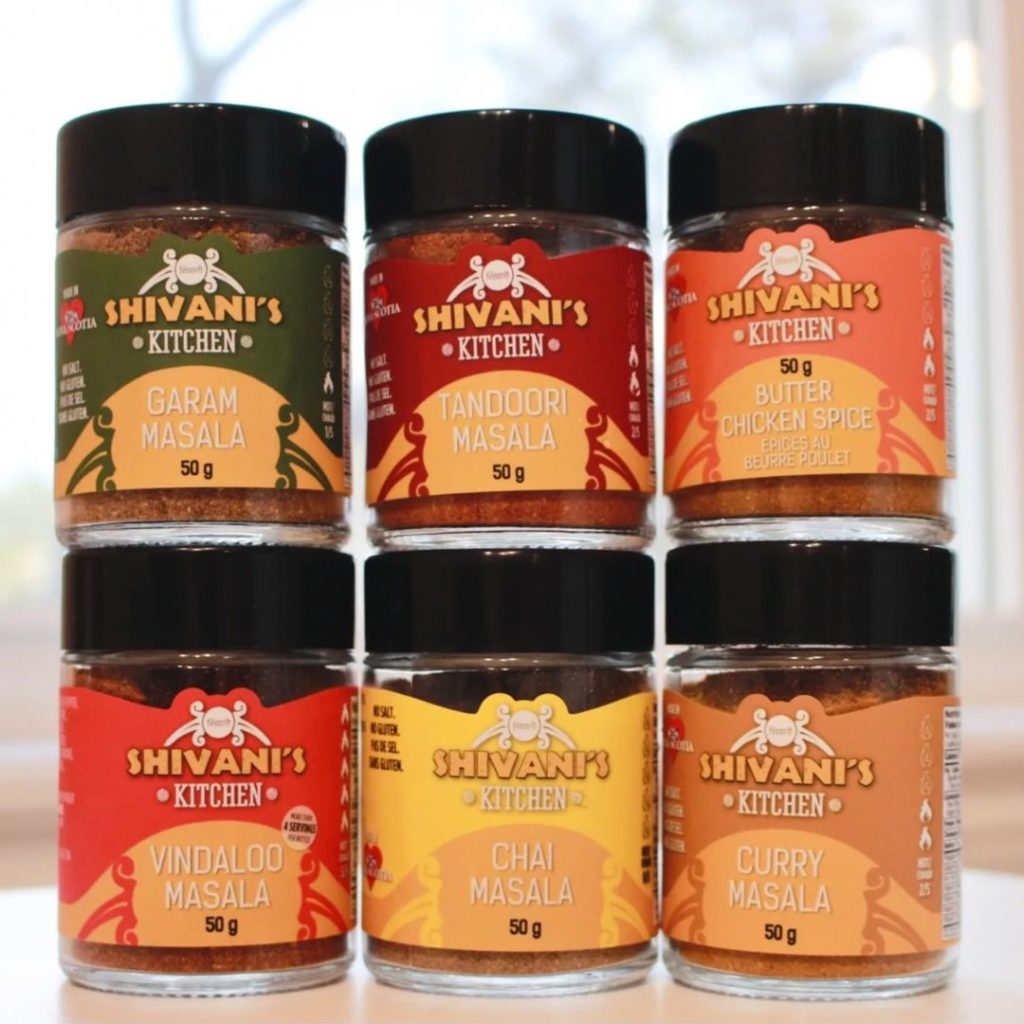By…
Thinking of exporting? Three Canadian women business owners share details about their export journey.
With support from Export Development Canada (EDC) and de Sedulous Women Leaders, they were ready to expand beyond domestic borders.

When it comes to exporting, you don’t need to have a big business to benefit. From growing your customer base to creating new revenue streams and increasing resiliency, expanding to foreign markets can have a substantial positive impact—no matter your company size.
To better understand the opportunity, we spoke with three small business founders—Muna Mohammed of Eight50 Coffee, Felicia Lekan-Salami of Milton Food Group, and Shivani Dhamija of Shivani’s Kitchen—about the benefits they’ve realized from exporting.
Their journeys all started with the iLaunchHERproduct program. Developed by de Sedulous Women Leaders, an organization committed to empowering, mentoring, supporting, and educating immigrant women in management and entrepreneurship, Export Development Canada (EDC) was a sponsor of the 2021 year-long program. It was designed to help Black women, women of colour, and immigrant women entrepreneurs who are retail-ready receive the necessary training, support, and tools to connect with buyers and grow their business.
It’s just one way EDC is deepening its impact on inclusion, diversity, and equity through a dedicated strategy to further engage with women entrepreneurs who also identify with other dimensions of diversity—and who face even more barriers when scaling a business.
Here’s what Muna, Felicia, and Shivani had to say about their exporting journey and the valuable insights they’ve gained from working with de Sedulous Women Leaders and EDC.


Muna Mohammed | Eight50 Coffee
Tell us about yourself and your business…
Eight50 Coffee is a purpose-driven coffee company with deep coffee roots. We named our business after the year 850 AD when coffee was first discovered in Ethiopia. To continue a family legacy in coffee and pay homage to my late grandfather, who was a coffee farmer, Eight50 Coffee was born in 2020.
After working in various organizations and leading marketing teams for 15 years, I decided to take a leap of faith and leverage my knowledge of coffee and expertise in marketing and branding to launch Eight50 Coffee. My passions include sharing ancient coffee traditions, discussing coffee’s origins, and working with coffee farmers and local artisans to create various sustainable coffee byproducts.
From flexible subscription options to brewing method resources, we also provide an array of premium, functional, and meaningful home, lifestyle, and coffee equipment products—from specialty brewing tools to traditional Ethiopian coffee cups—to complete the home brewing experience. Our focus is to provide responsibly sourced specialty coffee from around the world, all locally roasted here in Ottawa, so customers can truly enjoy our single origin and unique blends at home.
How has exporting impacted your business, and what’s next for you?
Exporting allowed us to access more diverse business partners and also broaden our product offering. Exporting has also helped increase sales and volume which allowed us to work with larger manufacturing partners, resulting in a decrease in production costs. We’ve been fortunate enough to grow our business from online sales and move into retail stores, gaining the interest of large retailers in the last two years while also growing our business opportunities in the U.S. market. This shift has been a game changer in how our business has grown and will continue to scale.
Training sessions, business seminars, specialist trade services, and support provided by EDC and organizations like WeConnect International and the de Sedulous Women Leaders iLaunchHERproduct program have been critical. There were some great workshops we accessed while working with iLaunchHERproduct where we learned about tools of the trade.
Accessing the resources and information EDC shared about international markets helped me make more informed decisions when assessing to work in international markets. Learning about EDC services definitely gave me more confidence to access markets I had not previously considered due to risk and lack of knowledge around the benefits of exporting. There are a number of untapped international trade opportunities we’ll be exploring, and building strong export strategies for each of those markets will be key to our ongoing success.
What advice would you share with other small businesses looking to export?
Begin by connecting with resources available to businesses through organizations, like EDC and your local Board of Trade available in your city. Work on creating an international marketing plan with clear objectives, and seek advice and help to discuss the legal and tax implications of going global with professionals early on.
The U.S. can be a great start for exporting, but being open-minded about exporting to markets overseas where your business may have additional potential for growth is key. By diversifying your reach outside of North American markets, the benefits can far outweigh the risks.
You were selected as one of the 25 iLaunchHERproduct entrepreneurs. What did you learn from the program?
The program challenges you to think in-depth about your business and capability when approaching large-scale suppliers. I learned about the power of collaboration between businesses as an entrepreneur, that you’re never too big or too successful to join new accelerators/business programs, and that there’s always something new to learn.
This program also prepared me to successfully pitch to buyers in ways I hadn’t previously done, and it led to successful outcomes for our company. Additionally, there’s a unique dynamic created when you bring 25 different women with successful businesses together—don’t take any of it for granted. Programs, like this, allow you to build deep business connections and a strong network of support.


Felicia Lekan-Salami | Milton Food Group
Tell us about yourself and your business…
Milton Food Group is a Toronto-based health-conscious snacking company that I founded in 2020. I started with Milton Pies, offering sweet and savoury options using traditional family recipes. Later in the year, after struggling with an intolerance to gluten and dairy, I discovered Galt Bakery and their gluten-free, dairy-free, and additive-free cookies. I knew that I had found the right products to promote and added them to the Milton Food Group portfolio. We have grown more than 20% every year since our inception.
Currently, with Galt Bakery, we have five cookie flavours and are rapidly innovating and increasing our product lines. This summer, we launched our super seed crackers in five flavours, debuting online at Costco. Our goal is to keep providing healthy snack options for our consumers nationally and internationally as we expand into the U.S. in October 2022 and launch our frozen pies as part of the Milton Pies brand in the spring of 2023.
.
How has exporting impacted your business, and what’s next for you?
Exporting has opened us up to a new growth engine as we develop this avenue for revenue, and it has given us the opportunity to discover new consumer needs that are inspiring us to innovate for the years ahead and scale. We’ve experienced increased interest and uptake for our brands in not only Canada, but also the United States, Mexico, the United Kingdom, and three African cities. What is critical to our ongoing success is increased production capacity to cater to our expansion goals and consumer demand across markets.
Through de Sedulous Women’s iLaunchHERproduct program, we were introduced to EDC’s exporting solutions, which we’re now exploring for further growth and expansion. One of the EDC webinars, How to build a winning export strategy, was very helpful as well; this helped identify the most effective and profitable exporting approaches to consider.
What advice would you share with other small businesses looking to export?
Start by researching your product’s unique market needs and define how you can creatively cater to them. You can get feedback from potential customers—which will help you streamline profitable opportunities—by participating in sampling at trade shows, pop-ups, and store demonstrations. Lastly, be bold and confident enough to reach out to foreign channels, and when you do, be clear on what you can offer and how you can add value and diversity to their portfolios.
You were selected as one of the 25 iLaunchHERproduct entrepreneurs. What did you learn from the program?
Networking is gold—together, we all can achieve more and better! Also, I learned that rising by lifting others is possible.


Shivani Dhamija | Shivani’s Kitchen
Tell us about yourself and your business…
I moved to Nova Scotia in 2011 with a diploma in public relations from Fanshawe College and tried working at various media and PR companies, but had no luck. It was while working at the Canada Games Centre in Halifax, NS, that a friend of mine told me that a trucker friend of hers was missing home-cooked Indian food and wanted someone to make food for him to take on his trips. He was my first client. I created a Facebook page publicizing my meal delivery services and got a tremendous response—people tried my food and wanted to learn to cook it as well. I created cooking classes as the second offering in my business in 2015.
Another opportunity presented itself after listening to the feedback from the cooking classes. People absolutely loved the classes, but found it difficult to find the spices to prepare the meals at home. Understanding the needs of my customers, we launched spice blends in 2016 and ready-to-use sauces in 2018. Just like our spice blends, our sauces are salt-free, gluten-free and have no preservatives. Now, my products can be found in The Real Canadian Superstore, Sobeys, online at Walmart, and on our website.
How has exporting impacted your business, and what’s next for you?
Many people, government agencies, and non-government organizations helped me and my business. Nova Scotia Business Inc. (NSBI) assisted me, both by providing training and financial support. Additionally, the Immigrant Services Association of Nova Scotia (ISANS) is a great resource for immigrants to build their life in the province; they’re so committed to their clients and helped start and grow my business. Now, I work with them as a mentor and try to do my social responsibility by supporting new immigrants, who have an eagerness for entrepreneurship—women, in particular. Additionally, I have had support from EDC. When I go out for conferences and meet any big retailers, I know I can tell them EDC is there to support me if they make this deal.
At Shivani’s Kitchen, we’re trying to export our products across the world. We just started by exporting to parts of the U.S. and Asia. Exporting means more revenue, but it also means more work on the marketing side. From my perspective, marketing and having adequate knowledge about our target market are essential to keep the business going smoothly.
What advice would you share with other small businesses looking to export?
It’s important to search and find your target market’s needs, recognize potential customers, and have an awareness of your competitors.
You were selected as one of the 25 iLaunchHERproduct entrepreneurs. What did you learn from the program?
Maintaining your ambition, self-confidence, and trusting yourself and your abilities. Also, believe that your dreams don’t have an expiration date.
By…
Meet Nadine Bernard, the Entrepreneur Bridging Indigenous and Corporate Canada, and RBC Canadian Women Entrepreneur Awards Micro-Business Winner
By…
How One New Brunswick Entrepreneur Built on a Family Legacy to Lead in the Automotive Industry
By…
The 9 Saboteurs Holding You Back — And How to Overcome Them
By…
How Do You Scale a $5,000 Idea Into a National Brand? This Entrepreneur Did Just That
By…
